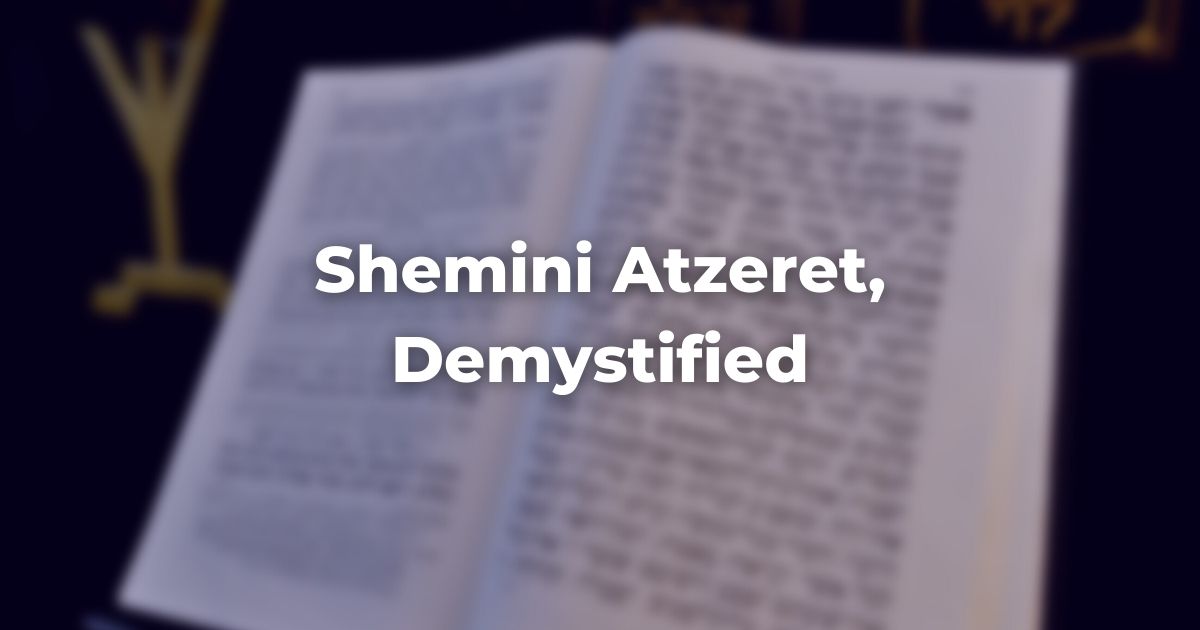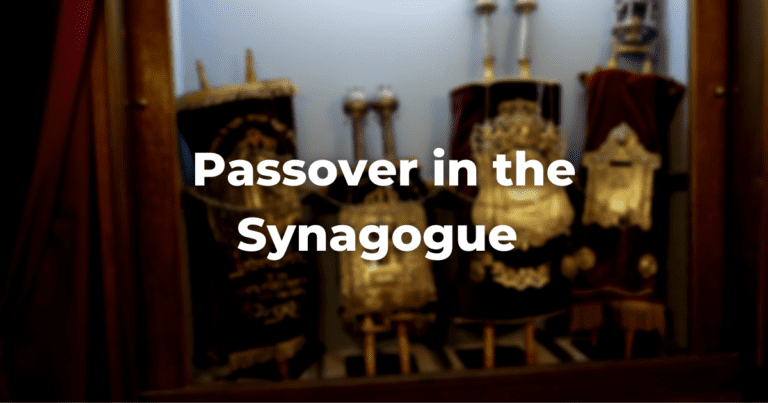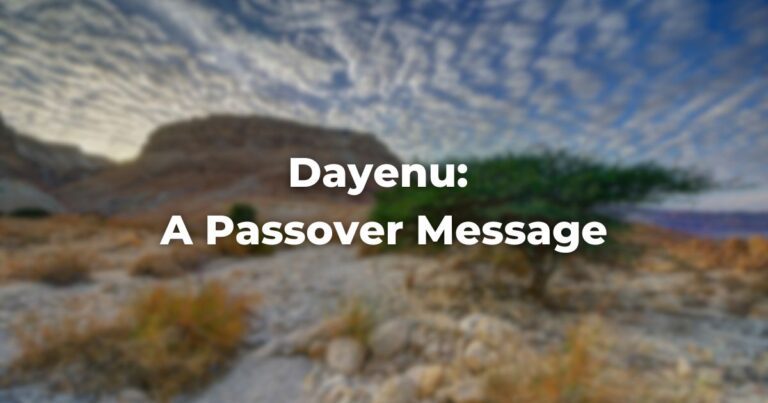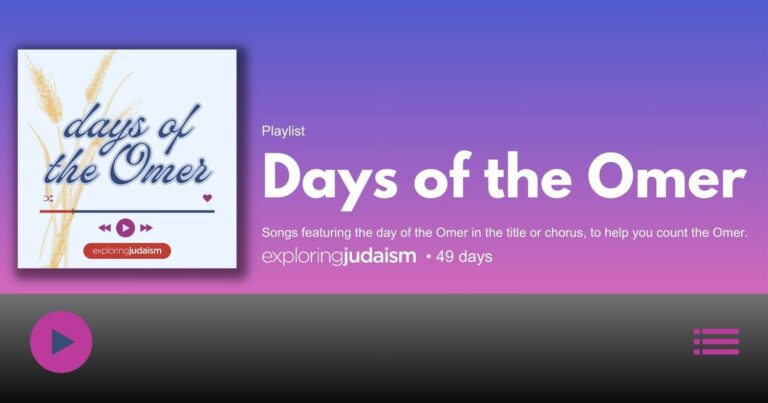Shemini Atzeret is an interesting, albeit confusing, holiday.
Coming as the eighth day of Sukkot, it poses a question for the generations: Is it a holiday on its own or just a continuation of what comes before it? For Jews of today, it might bring up even more questions, like what it is and how we celebrate it.
Shemini Atzeret comes directly from the TorahRefers to the first five books of the Hebrew Bible, the Tanakh, also called the Five Books of Moses, Pentateuch or the Hebrew equivalent, Humash. This is also called the Written Torah. The term may also refer to teachings that expound on Jewish tradition. Read more itself, in Leviticus 23. The people are commanded to observe Sukkot, a festival of booths, and the end of the chapter carries on to talk about lulav and etrog. Right between that, though, there is a single critical verse:
שִׁבְעַת יָמִים תַּקְרִיבוּ אִשֶּׁה לַיהֹוָה בַּיּוֹם הַשְּׁמִינִי מִקְרָא־קֹדֶשׁ יִהְיֶה לָכֶם וְהִקְרַבְתֶּם אִשֶּׁה לַיהֹוָה עֲצֶרֶת הִוא כָּל־מְלֶאכֶת עֲבֹדָה לֹא תַעֲשׂוּ׃
For seven days you will offer fire offerings to God, the eighth day will be a holy occasion for you, and you will bring fire offerings for God—it will be an atzeret and you will not do any work.
Leviticus 23:36
That’s it—that’s all she wrote.
The rabbis are faced by a perplexing question:
Is Shemini Atzeret its own holiday or part of Sukkot?
The strongest evidence that it might be part of Sukkot is that its timing is directly connected to Sukkot, and is arguably on the holiday itself. Similarly to the eighth day of Pesach—also a day where no work is done—the timing is based on the original holiday.
When you look at the practices of generations, past and present, it becomes more clear that there is a widely held belief that Shemini Atzeret is its own holiday.
There are a few areas in which this question on Shemini Atzeret is demystified.
Ancient Temple Practice
In the times of the Temple in Jerusalem, a particular offering was brought each day of Sukkot, but each day the Musaf offering was the same. On Shemini Atzeret, a different Musaf offering was brought.
The Levites also sung a particular Psalm as part of their practice for Sukkot. On Shemini Atzeret, they would sing a different Psalm—namely Psam 12, which begins, “On the eighth, a Psalm of David.”
Liturgy
The place in which this difference in holidays is most easily seen is in the liturgy. The special insertions for Kiddush and the Amidah change from being about Sukkot to being about Shemini Atzeret—these insertions are used for Simchat Torah as well.
During candle lighting and Kiddush, a Shehecheyanu prayer is added—signifying that it is the first time we have done this thing in a whole year. On the eighth day of Passover, there is no Shehecheyanu—it’s part of the same holiday that was celebrated earlier in the week.
There is also the special prayer of Geshem, praying for the rains in Israel, that we say on Shemini Atzeret. While it isn’t definitive proof, a prayer that is so important would likely not be said on a day that isn’t also a full holiday on its own.
Sitting In and Blessing the Sukkah
The question of sitting in the Sukkah is the most complicated and best display of the tension in deciding whether Shemini Atzeret is its own holiday or not. The rabbis of the TalmudReferring to one of two collections, the Jerusalem and Babylonian Talmuds, edited in the 6th century, that contains hundreds of years of commentary, discussion, and exploration of the ideas in the Mishnah. One could describe it as Mishnah + Gemara = Talmud Read more, in Masechet Sukkah, have a debate about whether or not one sits in the sukkah for Shemini Atzeret.
They go back and forth, as the Talmud does, and they come to a conclusion—kind of. They say that if one is sure that it is the eighth day, they do not reside in the Sukkah, but if there is a doubt, one does reside in the Sukkah but does not say the blessing.
Today’s practice (outside of Israel) is generally that one eats in the Sukkah on Shemini Atzeret but does not say the special blessing. By Simchat Torah the practice is to definitively not sit in the Sukkah, and some people take special care to not spend any time in the Sukkah to make sure it doesn’t even look like they might be sitting there because it is still Sukkot.
The Demystified Conclusion on Shemini Atzeret?
It seems clear through the practices that have developed that Shemini Atzeret is its own holiday. It is unique—in that it is a holiday that isn’t particularly unique—in most traditions today there are no rituals specific to Shemini Atzeret.
Shemini Atzeret is a holiday there just waiting for you to embrace it and find deeper meaning and new personal connection.
Author
-

Jacki Honig was raised in Las Vegas, NV, and has since lived in Detroit, MI and Austin, TX working in the USY world in various capacities. Now in her final year at the Ziegler School of Rabbinic Studies in Los Angeles, she is part of the inaugural class of Goldstine Fellows, and loves studying liturgy and drawing connections between ancient Jewish texts and the modern world. In her free time, she enjoys reading (especially science fiction!), spending time at Disneyland, hosting friends for Shabbat, and all sorts of tabletop gaming.
View all posts






